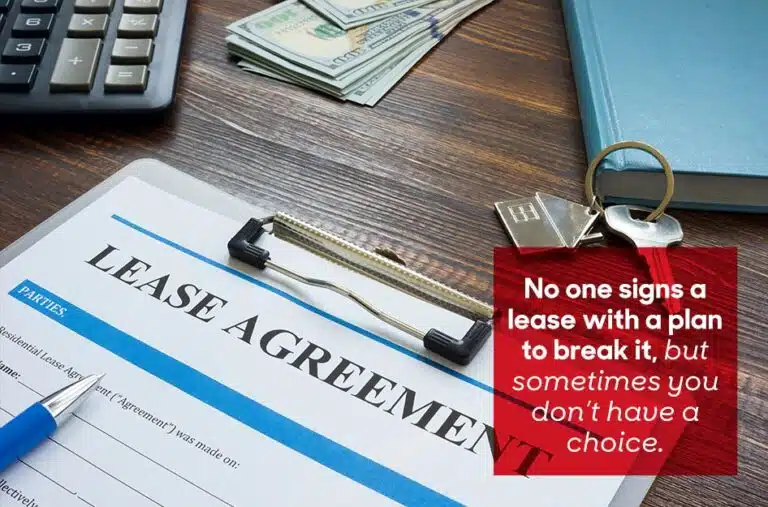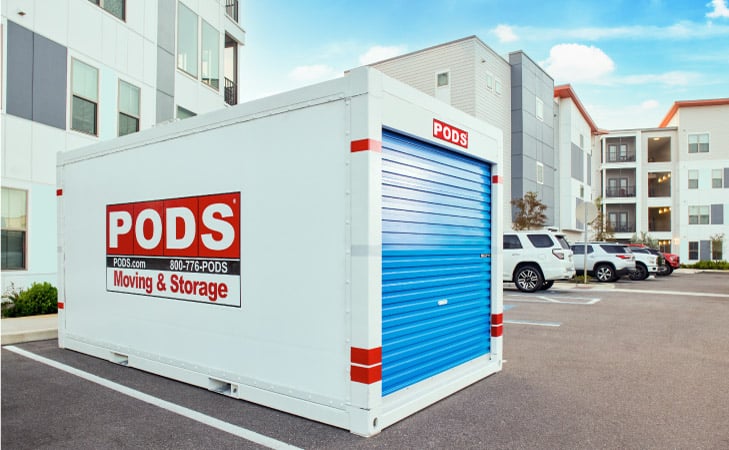
What to Consider Before Signing a Lease or (gasp!) Breaking a Lease
Real Estate Advice
There are many reasons for signing a lease instead of buying a home. First of all, rental communities typically come with attractive amenities (like pools, gyms, and clubhouses). Not to mention the reduced maintenance costs, and (ding, ding, ding!) rentals are a short-term commitment. That last part, term length, is one of the reasons renting an apartment is perfect for people who are still figuring out their long-term life goals.
But sometimes, even with the shortest lease available and regardless of your original plans, you need to bounce early. A new job opportunity arises, you need to move closer to family, or maybe the rental wasn’t as peaches-and-cream as it first seemed.That’s where this guide comes in. We’ll walk you through what you need to know before signing a lease or (gasp!) breaking one. Let’s jump in.
What are some important things to keep in mind before signing a lease?
What to know before signing a lease? Term length, monthly rent, and pet policies are just the beginning. Knowing all that you need to consider from the get-go is extremely helpful when choosing your next abode.
Let’s set the scene: You’ve toured a half dozen rental properties, weighed the benefits of each, and you’re ready to make your pick. Before moving ahead with the “sign here, initial there, and sign again here,” check out these questions to ask before signing a lease.
What’s the rent?
If the rental is out of your budget, you’re obviously not gonna sign. However, be aware that some leasing offices will offer special promotions for new renters (one, two, or even three months of free rent, for instance). If you’re only signing for one year, that can make all the difference in the world.
| Q: How do you negotiate before signing a lease? A: Promotions aside, things can be negotiated — even your rent. Simply have an open and honest discussion with your would-be landlord. For example, they may be willing to lower the price for a tenant with a solid rental history and good references, or perhaps you can make one larger pet deposit upon signing instead of paying a monthly pet fee. Be tactful if you go this route. You’ll be dealing with these people for the term of your lease, so a bulldozer approach is ill-advised. |
What additional fees should I be aware of?
You won’t just be paying the monthly rent. You’ll likely have to put down a security deposit and pay some monthly utility costs, among other things. Ask for their policies on trash pickup (both from the county/city and if there are services like valet trash), pest control, parking, and how they handle cable and internet.
Some complexes charge water bills by your unit’s square footage and overall complex usage, then divvy up the bill from there. Get some clarity from your leasing agent on how to handle that.
How long is the lease term?
You don’t want to get stuck somewhere for more or less time than you want to be there. If you only need a temporary place while you shop for a home in the area, see if you can sign a three-month lease (or however long you think is appropriate). If you go this route, expect to pay more each month than if you sign a lease for a year or longer, though.
How soon can I move in?
It’s a totally legitimate question: When can you move in after signing a lease? And you know what? You may be able to move in as early as the same day. Many landlords will prorate the rent, if it’s not the 1st or 15th of the month. All you have to do is ask. It typically comes down to how popular the apartment complex is and if the unit you’re looking at is still occupied. Tip: Get this date in writing.
What happens after the lease term ends?
Will you have to sign another lease or will you be making month-to-month payments? Some leases auto-renew at a month-to-month rate that is usually more expensive. If you’re planning to stay longer, you may want to sign a new lease in advance to try to lock in your rate.
Are pets allowed?
Some residential complexes have policies on what types of pets (if any) are allowed. There are places that also charge a monthly pet fee, as well as an initial pet deposit to cover the cost of any potential damage.
Is renter’s insurance required?
Many landlords won’t rent to you without proof of renter’s insurance. Luckily, plenty of landlords and apartments will enroll you with their own insurance if you need it (for a fee, of course).
What happens if I lose my keys?
Will the locks be re-keyed? If so, how much of that is your financial responsibility? Ask this same question for any fobs, security cards, pool key, etc.
Can guests use the common areas and amenities?
Some complexes have strict rules about how many guests can accompany you to the pool, clubhouse, fitness center, etc.
How much notice is required before vacating?
It’s common for a lease to require that you give at least a 30-day notice prior to moving out, regardless of where you are in your lease term. It’s possible, however, for a landlord to require more than a 30-day notice, so it’s important to understand your own lease agreement. Similarly, if a landlord intends to raise the rent, some states require that they let you know in advance.
What happens if you break a lease on an apartment or other rental?
It depends on where you live, but breaking a lease typically means paying an early termination fee — usually equal to one or two months of rent, but there may be additional fees, as well.
Can I pay my way out of the lease?
Confirm with your landlord how many months of rent you’re required to pay to break the lease, if it’s possible. Likewise, see if the penalty fees can be waived if you’re able to find another suitable renter before you leave.

What are some important things to keep in mind before breaking a lease?
Unfortunately, knowing how to break a lease isn’t as simple as ripping up the agreement and hitting the highway.
Life happens. You get a new job, you need to relocate to be closer to family, or you simply find a better place to live. In situations like these — where it looks like cutting your lease short makes the most sense — what do you do? What can you do? Here’s what you need to consider before you start seriously thinking about breaking your lease.
- Breaking your lease can affect your credit score and/or your ability to rent in the future (because it may result in a bad reference).
- It may cost more to break your lease than to live it out or to simply move and keep paying rent, depending on how much time you have left on your lease.
- You may have to pay two months of rent to break the lease. That’s double your monthly housing expenses all at once.
- You’ll likely lose your security deposit if you break the lease.
- You may get hit with additional fees upon inspection. Is there a hole in the wall from when you moved your dresser? Are the stove’s drip pans filled with remnants of burnt soup? Before discussing breaking your lease, you’re gonna want to make sure things are in good shape.
Remember: More than likely, the landlord doesn’t want you to break your lease and the news may come as a big surprise. Keep that in mind and try to be as understanding and accommodating as you can. As the saying goes, you can catch more flies with honey than with vinegar, right?
| Q: Can you get out of paying penalty fees if you need to break your lease? A: It may be possible to avoid paying penalty fees when breaking a lease, but that typically only happens in certain extenuating circumstances. For example, you’re called to active military duty, there’s an ongoing pest infestation that the landlord hasn’t resolved, etc. It all comes down to the legislation in your particular state, so it’s a good idea to make yourself aware of these special cases to see if any of them apply to you. |
All right, now that we’ve covered the repercussions of breaking a lease, let’s dive into the business of how to actually do it.

How to break a lease (if it comes to that)
Double Check the Lease
Not all leases are created equal. Now is a good time to jump back in and re-familiarize yourself with the fees for breaking your particular lease. They may not be so bad.
Check the Laws
As we mentioned earlier, each state has its own set of laws and regulations related to getting out of a lease without penalty. You’ll first want to do some research on what those statutes are. Laws related to rental agreements can get pretty complex, though, so your best bet may be to refer to a contract attorney.
Some examples of how rental laws can help? If your rental is considered uninhabitable due to an unresolved pest infestation, neglectful landlord, black mold, etc., you may be able to get out of your lease scot-free. Alternately, if your rental agreement was invalid to begin with, this could possibly relieve you of any further obligation.
Ask Your Landlord
If your personal situation doesn’t fit one of those extenuating circumstances, then you’ll want to talk to your landlord or leasing agent. If you’re a good tenant and they’re gracious, you can explain your situation and they may let you bounce without a problem. We can’t guarantee they’ll help you out, but you miss every shot you don’t take, right?
Explore Your Other Options
Some leases allow you to transfer your lease to someone else, letting you off the hook — though there may be a cost associated with the transfer. Check your lease or reach out to your leasing office to see if this is possible. If not, see if your landlord will cut your lease short if you can find an adequate replacement to sign a new lease for that unit.

Don’t let your lease status slow down your plans
If you need to move soon, start prepping for your move while you sort things out with the leasing office. As you now know, breaking a lease can be a tricky business, but moving doesn’t have to be. With PODS, storage is built into every move, so your move can be as flexible as you need it to be.
Using a PODS container to start packing and loading your things (and then storing them) while you work out the final details of terminating your lease can help to keep things moving in the right direction. Then, once you’re “free” to turn in your keys, it’s just a matter of having your container delivered to your new place.
Learn more about how to move efficiently — whether you plan on breaking your lease or not — on the PODS Blog.
Bonnie Azoulay Elmann is an NYC-based freelance writer and frequent contributor to the PODS Blog. Her work has appeared in Glamour, Health, and Parents, among others. She is an extremely driven digital storyteller who may or may not have a slight obsession with fanny packs.
Related Articles
Comments
Leave a Comment
Your email address will not be published. Required fields are marked *
